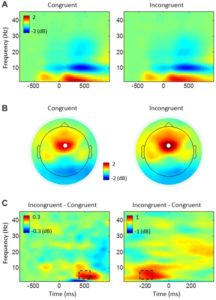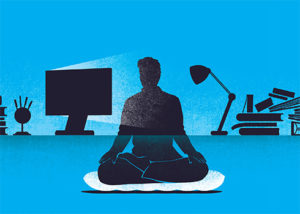The Sense of Thought
By John M. de Castro, Ph.D.
“Whatever you see you must be mindful of as it really is. Whatever you hear you must be aware of as it occurs. Whatever you smell you must be aware of as it really occurs. Whatever you taste you must be aware of as it really occurs. Whatever you touch you must be aware of as it really occurs. Whatever you think or think about you must be aware of as it really occurs.” – Buddha
The Buddha identified not five senses as traditional Western thought does, but six sense doors; vision, audition, olfaction, gustation, touch, and thought. The first time I read this I was taken aback; thought as a sense! I always considered thought as processing sensory information, not as a sensory experience itself. Indeed, Descartes stated “Cogito ergo Sum”, “I think therefore I am.” Thinking was the ultimate evidence of existence, not just a sense impression. But, for a moment reflecting on Descartes phrase “I think therefore I am,” I along with many others realized that the “I” refers to something other than the thinker! Something is sensing thought, even thinking about this.
It is not clear that thought is a separate sense. Rather it appears to take advantage of the brain systems used for processing information from the external world. That is why we can “hear” our internal voice, “see” imagined scenes, or “feel” remembered emotions. Also, chefs can “taste” and “smell” imagined dishes; mentally combining ingredients. There’s been a long standing controversy in Psychology regarding whether there is thought without some kind of internal sensory experience, called imageless thought. The issue is not resolved but what is clear is that the vast majority of thoughts involve mental images. Hence, it appears that thoughts are not something other than the traditional senses but take advantage of them. Perhaps we sense thought through sensing the influence of thought on the traditional senses. But, still something is sensing this and it isn’t the mind, the source of thought.
There is clearly, however, imageless experience or awareness. Awareness itself observes sensations and thoughts, including the images accompanying thoughts, but does not itself have images. It is pure contentless awareness. In advanced meditative states, this contentless awareness can be directly experienced. Even the novice practitioner can experience this by paying close attention to the gaps that exists between thoughts. But, the thoughts that the Buddha was talking about are the processes of the mind and these appear, for the most part, to involve images. These, in turn, appear to be experienced, not by the mind, but by something else that we label awareness.
We appear to be incapable of truly controlling thoughts. We believe that we are in control. But, meditation practice immediately reveals that we can’t. Try as we may to concentrate on one thing, control our thinking and focus our attention, the mind inevitably wanders off into other things; planning for the future, ruminating about the past, interpreting experience. We don’t seem to be able to control it. Rather than being in control of thoughts, thoughts appear to be in control of the mind, but do so in such a sneaky way that they provide the illusion that we’re in control. As Eckhart Tolle said “Then the mind is using you. You are unconsciously identified with it, so you don’t even know that you are its slave. It’s almost as if you were possessed without knowing it, and so you take the possessing entity to be yourself.”
We may not be able to control our thoughts, but we can step back and witness them. Just like our awareness senses lights, sound, etc. it can sense thoughts. This is why the Buddha classified thought as a sense. If you watch these out of control thoughts it begins to dawn on you that there’s a distinct separation between your awareness and thoughts. The thoughts begin to appear almost alien, like they’re not really yours. As Eckhart Tolle said “So when you listen to a thought, you are aware not only of the thought but also of yourself as the witness of the thought. A new dimension of consciousness has come in. As you listen to the thought, you feel a conscious presence – your deeper self – behind or underneath the thought, as it were. The thought then loses its power over you and quickly subsides, because you are no longer energizing the mind through identification with it. This is the beginning of the end of involuntary and compulsive thinking.”
So, the fact that we can’t control thoughts adds to the case that thought is, as the Buddha said, a separate sense. Just like our classical five senses we can’t control their content, we can only experience them. This is an important insight. As Jon Kabat-Zinn said ““It is remarkable how liberating it feels to be able to see that your thoughts are just thoughts and that they are not ‘you’ or ‘reality.’ For instance, if you have the thought that you have to get a certain number of things done today and you don’t recognize it as a thought but act as if it’s the ‘the truth,’ then you have created a reality in that moment in which you really believe that those things must all be done today.” So, by recognizing thought as just another sense, the inner self, the awareness of sensing, is revealed.
This can be practiced, especially during meditation. Watching thoughts is what you do in open monitoring meditation. You simply watch them and don’t react to them; just letting them arise, and fall away. Here you can clearly observe thoughts passing through, completely out of control, but when you don’t dwell on them, they pass on through and disappear. But, nonetheless, whether they stay or not, they are experienced. It can’t be emphasized too much what an important insight this is. As Eckhart Tolle observed “The most decisive event in your life is when you discover you are not your thoughts or emotions. Instead, you can be present as the awareness behind the thoughts and emotions.” This is when you begin to realize the nature of your true self. This is when you begin to see things as they really are. This is when you begin to awaken.
“Since, if one leaves the senses of the eye, ear, nose, tongue, body & mind uncontrolled,
then evil detrimental states such as greed, lust & discontent invades & dominates the mind!
Therefore does one train control of the senses, guarding the senses, holding back the senses,
and one keeps in check these six wild-running senses…” – Buddha
CMCS – Center for Mindfulness and Contemplative Studies
This and other Contemplative Studies posts are also available on Google+ https://plus.google.com/106784388191201299496/posts and on Twitter @MindfulResearch






